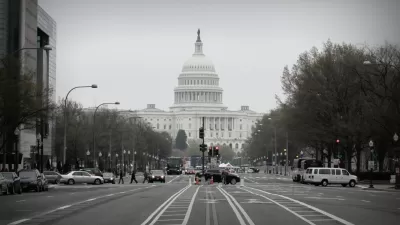A New York city councilmember, trained in urban planning, presents ideas for protecting tenants and small businesses in the ongoing economic downturn.

Brad Lander, member of the New York City Council representing parts of Brooklyn with a master's in urban planning, writes in The New York Times about the need to empower public and social interest in the real estate market in the wake of the coronavirus depression—preventing a 'feeding frenzy' by private developers.
So as the havoc of Covid-19 stirs the same dire warnings of New York’s demise as were heard during the 1970s fiscal crisis, history provides lessons in how not to respond. Fortunately it also provides a lesson for how we can rebound, using social ownership of land to help create a just, vibrant and durable recovery.
Citing the examples of Penn South in Chelsea and the Brooklyn Navy Yard, Lander also proposes legislation that outpace anything in D.C. or Albany that would support tenants and small businesses through the economic difficulties of the pandemic.
Instead of letting distressed properties be auctioned off when owners default on mortgages and taxes, the city should step in. We could acquire and hold these properties temporarily through a city-controlled land bank, based on legislation I’ve introduced, and then transfer them to a growing network of community land trusts, nonprofit entities that hold land in perpetuity for publicly beneficial uses.
The time to protect the interests of the public from the power of big money, according to Lander, is now—even if some of the long-term effects of the economic downturn aren't yet apparent.
FULL STORY: How to Avoid a Post-Recession Feeding Frenzy by Private Developers

Planetizen Federal Action Tracker
A weekly monitor of how Trump’s orders and actions are impacting planners and planning in America.

Maui's Vacation Rental Debate Turns Ugly
Verbal attacks, misinformation campaigns and fistfights plague a high-stakes debate to convert thousands of vacation rentals into long-term housing.

San Francisco Suspends Traffic Calming Amidst Record Deaths
Citing “a challenging fiscal landscape,” the city will cease the program on the heels of 42 traffic deaths, including 24 pedestrians.

Amtrak Rolls Out New Orleans to Alabama “Mardi Gras” Train
The new service will operate morning and evening departures between Mobile and New Orleans.

The Subversive Car-Free Guide to Trump's Great American Road Trip
Car-free ways to access Chicagoland’s best tourist attractions.

San Antonio and Austin are Fusing Into one Massive Megaregion
The region spanning the two central Texas cities is growing fast, posing challenges for local infrastructure and water supplies.
Urban Design for Planners 1: Software Tools
This six-course series explores essential urban design concepts using open source software and equips planners with the tools they need to participate fully in the urban design process.
Planning for Universal Design
Learn the tools for implementing Universal Design in planning regulations.
Heyer Gruel & Associates PA
JM Goldson LLC
Custer County Colorado
City of Camden Redevelopment Agency
City of Astoria
Transportation Research & Education Center (TREC) at Portland State University
Jefferson Parish Government
Camden Redevelopment Agency
City of Claremont





























